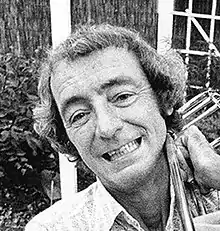Tommy Turk
Thomas Eugene Turk (July 2, 1927 – August 4, 1981) was an American jazz trombonist.
Tommy Turk | |
|---|---|
 | |
| Background information | |
| Birth name | Thomas Eugene Turk |
| Born | July 2, 1927 Johnstown, Pennsylvania, U.S. |
| Died | August 4, 1981 (aged 54) Las Vegas, Nevada, U.S. |
| Genres | Jazz |
| Occupation(s) | Musician |
| Instrument(s) | Trombone |
Early life
Thomas Eugene Turk was born in Johnstown, Pennsylvania on July 2, 1927.[1][2] His father, Joseph,[3] was a coal miner and self-taught trumpeter.[1] Tommy got his first trombone when he was in fourth grade of school.[3] His elder brother, Rob, was also a trumpeter.[1] The three of them played in a band with two neighbors, and Tommy developed some fast-playing technique when playing polkas in the band.[3] He had further musical experience in the Conemaugh High School band,[3] and graduated from the same school[1] in 1944.[3] The brothers then continued playing together in a University of Michigan campus band, but Tommy soon joined the army, where he also led bands.[3]
Later life and career
Turk left the army and then moved to Pittsburgh, Pennsylvania, in 1947.[3] He became established there as part of the Deuces Wild quintet.[1] Their playing helped Turk develop a reputation, and when promoter Norman Granz heard him play, he invited Turk to appear with his touring group of major jazz figures when they performed at the Syria Mosque in Pittsburgh.[3] His appearance was a success, and Granz recruited Turk to play in Chicago, and for several months in 1948 as part of Jazz at the Philharmonic.[3]
Turk can be heard on several CDs with Charlie Parker. In 1949 he was a member of Flip Phillips and His Orchestra, together with John D'Agostino, Buddy Morrow, Kai Winding, Sonny Criss, Mickey Crane, Ray Brown and Shelly Manne,[4] and on December 1, 1949, he led a group including Ray Brown and Buddy Rich that recorded four tunes under the name "Tommy Turk and His Orchestra".[5] Nevertheless, he decided to stay in Pittsburgh, where he could control what he played and enjoyed life[3] – in the 1950s he continued playing with Deuces Wild.[6]
In 1954, The Pittsburgh Press reported that Turk was considering leaving the area because his annual earnings of less than $5,500 from leading Deuces Wild were inadequate.[3] At the time, he had a wife, Mary, and two sons – Tommy Turk Jr, aged three, and Charles, aged two.[3]
Turk also recorded with Billie Holiday,[7] Ella Fitzgerald and Flip Phillips around the same time.[4] In 1972, he performed at the Pittsburgh Jazz Festival with a band led by Roy Eldridge.[8]
For many years Turk led a quartet that played at the Point View Hotel in Brentwood, Pennsylvania.[9] He later moved to Las Vegas, to play in house bands.[10] The Brentwood band reformed in 1976, and later recorded the album The-Truth!!! as a quintet.[10]
Death
Years later, Turk was living and performing in Las Vegas. On August 4, 1981, he was fatally shot by robbers at a tavern in that city.[11] The Pittsburgh Press reported that Turk was "shot in the head for no apparent reason as he and other patrons lay on the floor of a tavern liquor store during a holdup."[11] One eyewitness reported that Turk had difficulty lying flat and did not take out his wallet quickly enough for the killer.[12] Four gang members were charged in relation to the killing.[11] The 15-year-old who shot Turk was made eligible for parole in 2005.[12] Turk, who was 53,[13] was survived by his wife and two sons.[1]
Further reading
References
- Leonard, Vince, "Trombonist Turk Slain in Las Vegas" Pittsburgh-Post Gazette, August 6, 1981, p. 6.
- "Thomas Eugene Turk World War II draft card". National Archives and Records Administration. Retrieved 13 August 2023.
- Kohler, Roy (April 11, 1954). "Does It Pay to Play?". The Pittsburgh Press. pp. 3–4.
- Verve Records Discography 1949
- Jazz Records, 1942-1965: A Discography By Jørgen Grunnet Jepsen
- Peña, Carlos E., Pittsburgh Jazz Records and Beyond, 1950–1985, "Pittsburgh University Master's Thesis" (PDF). Archived from the original on June 9, 2007. Retrieved 2009-10-02.
{{cite web}}: CS1 maint: bot: original URL status unknown (link) - Lady Sings the Blues at Discogs.com
- Garland, Hazel (June 24, 1972), "Jazz Festival Was Great But Attendance Could Be Better" Pittsburgh Courier, p. 16.
- Frushell, Richard (December 12, 2010) "The Next Page / An Upright City: Pittsburgh and the jazz bass" Pittsburgh Post-Gazette.
- McHugh, Roy (December 8, 1977). "Turk Scales to 'The-Truth!!!'". The Pittsburgh Press. p. 2.
- "Tommy Turk Killer Gets Life" (May 14, 1982) The Pittsburgh Press, p. A-7.
- "After 24 years, Las Vegas murderer has chance for parole" (December 15, 2005) Las Vegas Sun.
- "Trombonist Killed During Bar Hold Up". The Daily News. August 6, 1981. p. 2. Retrieved August 16, 2014 – via Newspapers.com.

- Milsop, Joe (April 20, 1950). "Juke Box Review". The Progress. p. 11. Retrieved August 16, 2014 – via Newspapers.com.

- "Tommy Turk Discography". jazzdisco.org Retrieved August 16, 2014.
- Cook, Richard; Morton, Brian (1996). The Penguin Guide to Jazz on CD (3rd ed.). Penguin. p. 1021. ISBN 978-0-14-051368-4.
- Cook, Richard; Morton, Brian (2008). The Penguin Guide to Jazz Recordings (9th ed.). Penguin. p. 774. ISBN 978-0-141-03401-0.